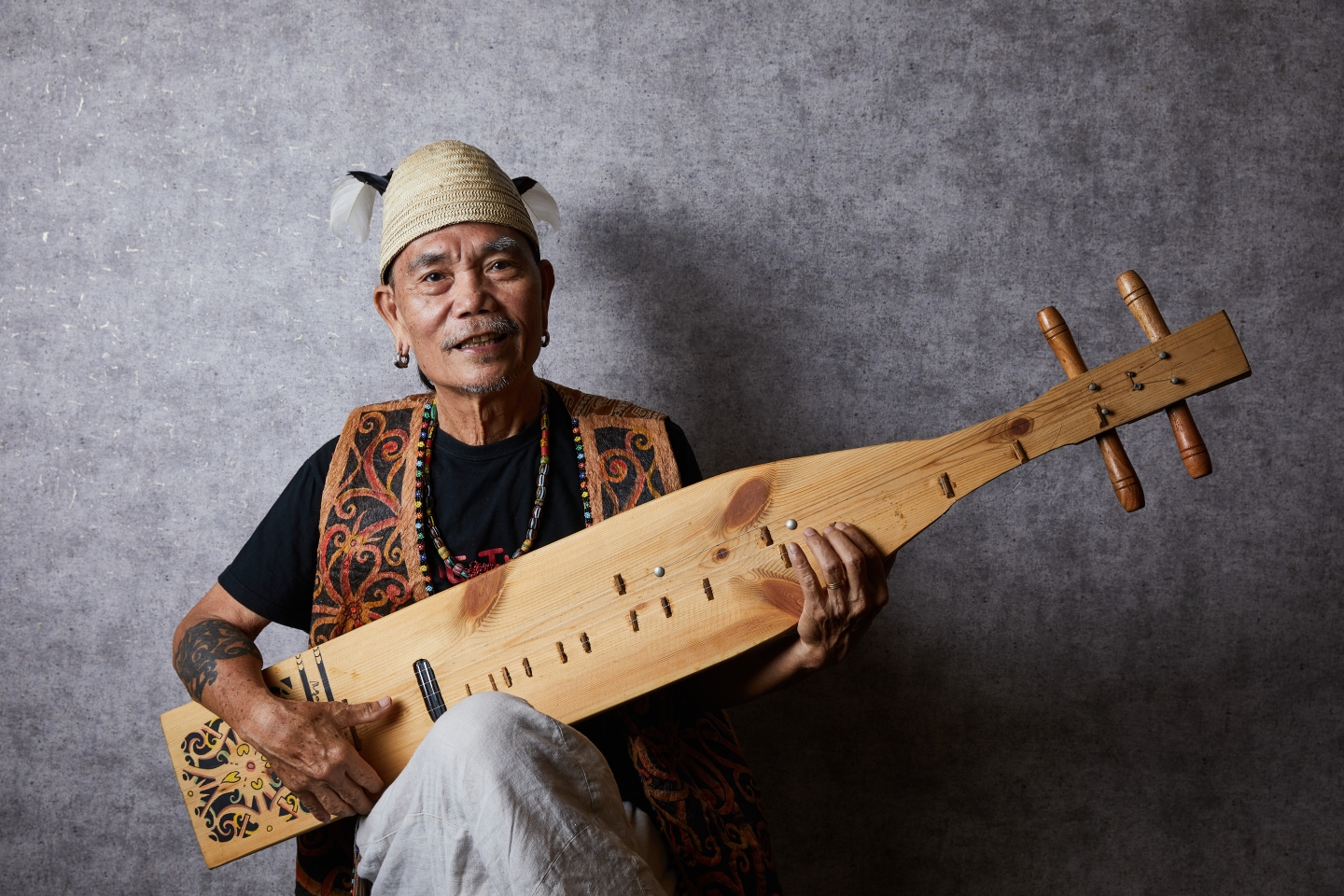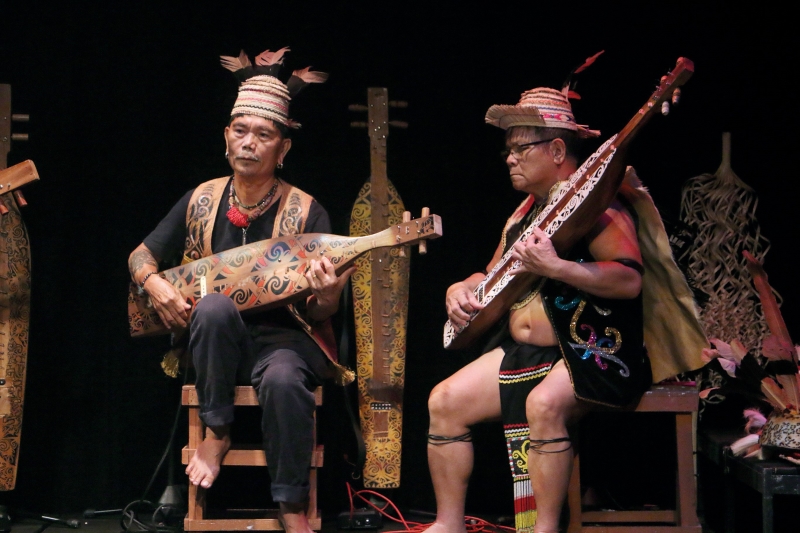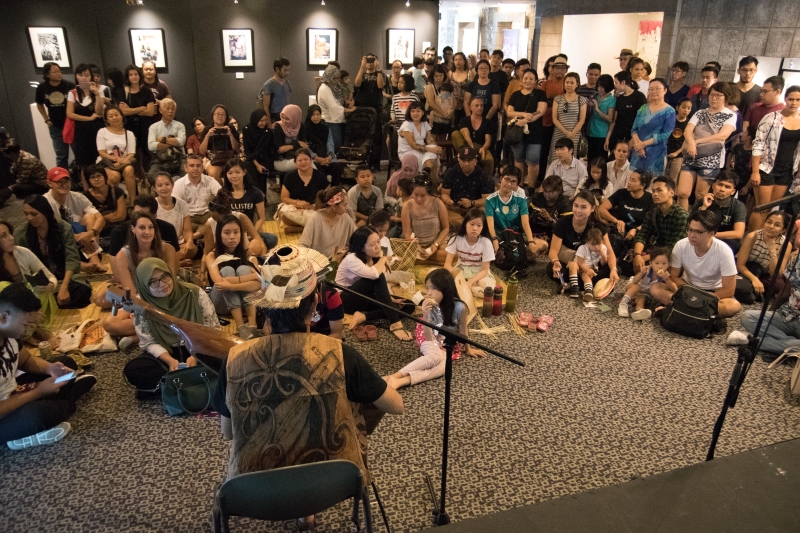
The 72-year-old was proclaimed a “National Living Heritage” by Malaysia’s Ministry of Tourism, Arts and Culture in 2015 (Photo: Keen Keong)
Mathew Ngau Jau is not a fan of hectic city life, though there is certainly something to smile about as he visits Kuala Lumpur this week for a very special recognition at the 19th Boh Cameronian Arts Awards (BCAA).
The 72-year-old sape maestro’s exploits in the realm of arts and culture speak for itself. In 2015, he was proclaimed a “National Living Heritage” by Malaysia’s Ministry of Tourism, Arts and Culture for his contributions to the revival and growth of the traditional Bornean string instrument, as well as embodying the precious culture of his people, the Kenyah Ngorek, beyond just its music.
The artiste is nevertheless effusive in his thanks for the Lifetime Achievement award bestowed by the BCAA.
“[I’m very thankful] to those who recognise my Orang Ulu culture and the sape. This will help spread awareness that our culture is very much alive,” says Mathew happily.
As we spoke, Mathew was just taking a break from working on the garden of his home in Kampung Begu in Padawan, Sarawak — his late wife’s Bidayuh village — an activity he loves. It would explain the cheerful and friendly tone as he recounts his early life.
A sub-tribe of the bigger Kenyah indigenous group, the Ngorek were early settlers in Upper Baram. Mathew himself was born in Long Semiyang, in one of the longhouse settlements in Ulu Baram.
“There were 10 of us, though now there are only three left,” he says of his siblings. “I am number six, I think.”
His was the kind of childhood indigenous children today no longer experience.
“Most of the time, we were working with our parents in the paddy fields or on the farm. We had to paddle our boats to reach it. We also went hunting in the jungle and fishing — that was our life,” he recalls fondly.
kelunan2019-1.jpg

When rock ‘n’ roll was taking the world by storm in the 1960s, Mathew says the only music they knew in the longhouse was when the elders returned from the farm or field, sat by the verandah with a small lamp providing a bit of light and played the sape at night.
“Those old uncles didn’t allow us to hold the instrument while they were away, they would hide it high up beyond our reach. But I would climb up and get a hold of it,” he laughs at the memory.
One may chalk it up to destiny’s calling — if not a naughty child’s antics — but Mathew believes he was more curious, and perhaps bored, than genuinely musically inclined.
There was no formal training. By then a primary schoolboy “strong enough to go into the jungle”, the maestro insists he “would just watch the uncles play, and then try it when they were not around. As you go on, you pick it up”, he adds.
Growing up and being part of the generation who moved into urban areas for a career far different from that of his parents, Mathew was accepted into the Batu Lintang Teachers’ Training College, now called Institut Pendidikan Guru Kampus Batu Lintang — the first teachers’ training college in Sarawak, where he also met his wife.
It was while he was serving as an English language teacher in Kuching, where he eventually settled and started his family, that the possibility of being a full-time artiste arose.
“The tourism officials were searching for people who could play the sape, to perform at functions and events. They had difficulty, because not everyone could access the villages, and even if they could, many of the old folks had passed on.
“I was available in the city, and as there were so few of us, they always invited me to play,” shares Mathew.
Soon, he gave up a stable decade-long teaching career to become a full-time sape musician. “That was also when I decided to take it up seriously.”
at_sifa_for_mepaan_may_2022_-_l-r_adrian_juvita_mathew.jpg

World of possibilities
A turning point moment for the Bornean arts and culture scene was the Rainforest World Music Festival (RWMF) that started in 1998. Along with its growth into an internationally prominent stage for world music was a coincidental evolution for Mathew as a musician.
“The festival pushed me to improve even more. I went home and asked all the sape-playing elders to teach me. I even invited those who could play well to join me in performing,” he says.
In fact, Mathew would count two legendary players as his teachers and mentors. One of them was Tusau Padan.
The story goes that after his passing, the world-famous musician appeared in a dream to Mathew, asking the latter to do his utmost for sape music.
Another respected player was Uchau Bilung, Mathew’s uncle, with whom he formed Lan-e Tuyang (meaning “among friends”). The duo performed at the RWMF and overseas until Uchau’s passing, after which Mathew would invite his cousins, nephews and even one of his sons to play. Often, there would be collaborations featuring other local instruments, and Mathew would even do the warrior dance during showcases.
His sape has taken him all the way to Santa Fe in New Mexico, the US, in one of his favourite performing experiences to date, and all over Europe among many other countries. This year alone, Mathew has performed in Arizona and Texas, and before that, Italy, with some of his nephews.
Each time, he would “welcome” the audience to his village in the rainforests of Borneo, telling them stories of his people, with the mellow lilting sounds of the sape strings evocatively, prompting them to imagine what he is singing about.
“They always tell me that when they hear our music, they think of the rainforest, the rivers and the waterfalls,” describes Mathew.
The musician is particularly proud of his work in putting traditional folk stories and songs to sape music.
“Our traditional songs like Lan-e Tuyang and Leleng, are usually sung without music.” So he created a sape accompaniment. It adds elements of a story that draws people in.
Evolution of the sape
Meeting other musicians from around the world and travelling the globe brought with it new possibilities, and the evolution of the sape and traditional music scene in Sabah and Sarawak has been directly and indirectly impacted.
“I learnt how to be more fluid and would join different types of musicians and performances with my sape,” says Mathew.
His generation started adding more strings to the sape, and creating instruments that are amplified for professional performances.
“The world changes, so we follow the trend of technology. Today, there is even a six-string sape that the young ones play. It sounds like a guitar. Maybe they think it’s better? The most I play is three to four strings. I usually play the traditional version,” he highlights.
Things have certainly come a long way from the days when the sape was used by the dukun or bomoh [Malay shaman] to heal the sick.
“They were more popular than the doctor, since there were not many doctors around. The dukun would play the sape in a healing ritual, calling to the spirits with a dance to cure the illness,” Mathew explains.
With evolution, come squabbles. “I’m already seeing it, some young ones — especially those who don’t know the history and story of the sape — are claiming, ‘This is my sape, that is your sape [style]’.”
That is why as a teacher, he consistently ensures his students, old and new, learn the original tunes and adat (custom), the roots of and stories behind the instrument.
“After that, it’s up to you. We don’t stop anyone from playing, even those from other races, and are happy to see it.”
Having taught many of the sape players today, including Alena Murang, Mathew is open-minded about passing on his skills and experience to anyone who is willing to learn.
ysdaf2018-1.jpg

“Sape lessons are not like those of the guitar. Usually, after two to three hours, you can master one or two tunes. Once you learn the basics, you can progress on your own.
“So, students I have taught, they don’t come back after some lessons. I see them performing even,” he laughs, adding that he’s happy for them as long as they have the confidence to play.
He has cut back on teaching post-pandemic and these days, looks forward more to other favourite pastimes, such as traditional painting — he sells works online via his website and takes them with him to music festivals — and even tennis, a sport he picked up as a teacher.
“I reached state level at one point and went to KL to lawan (compete against) those people. We Orang Ulu are natural sportsmen,” he quips.
He still makes sapes whenever he gets an order. The instrument is handmade from wood such as the Adau, Lemelai and Tebuluh and takes about two weeks to produce. Each is painted with traditional Kenyah motifs.
Mathew also aims to cut back on travel in the years to come, citing the recent US visit as a rather arduous trip. When he’s back in Sarawak, he tends to head straight to the jungle, to his village and garden to rest.
“I was in KL with my son last week. Aiyo, it’s not meant for me. I told him, ‘I’d better go home. One week is enough’.”
Not that he is giving up his sape or music anytime soon, as they keep him close to his roots.
“It is a way of life. Now I am an old man living in the city, but my mind is always on my younger days in the village. When I play the sape or practise things from my culture, it takes me back to my parents. You close your eyes, and it’s like a channel switch, you remember the good times in the olden days.”
It is a love for culture and tradition that he hopes to pass on to the next generation, and is glad to see one of his four sons now taking up traditional painting as well.
Mathew believes things are in a good place now, where traditional musicians can even make a living as full-time artistes. The Sarawak government is supportive of the arts and there is funding in many places, if they know how to apply. Though he qualifies it doesn’t mean they will be wealthy.
In recent years, he has also benefited from being under the Tuyang Initiative, a social enterprise that manages and helps promote artistes and their art.
As an example of what the next generation of traditional musicians can do, he speaks with quiet pride about his son’s band, At Adau, a seven-piece collective that is making waves by contemporising traditional Sarawakian folk music from different tribes.
At last year’s RWMF, the band, dressed in bright Hawaiian-style shirts and shorts with trendy straw hats designed using traditional Bornean motifs, performed a rousing set in their seventh outing at the festival. The sape, played like how a rock star would the guitar, entertained the crowd as the band got everyone dancing. Midway through, in between songs they paid tribute to their ancestors, telling the audience, “because of them, this thing is inherited and passed on till now”.
It is the change that Mathew speaks about, one that he says he’s happy with and accepts. Remembering the days when his own elders would scold him for changing their culture and traditions, he divulges, “They said it was because I was playing the instrument in a different style.
“I didn’t tell them then, but they failed to see it was the only way to keep the sape alive and growing. Whenever I went to the longhouses, no one was playing the instrument anymore. Only the people in the city, whom I taught, were playing it,” he says in earnest.
When one talks about passing the baton and keeping traditions alive, Dutch historian Johan Huizinga’s quote comes to mind: “If we are to preserve culture, we must continue to create it.”
In his own way, Mathew inspires us to consider what legacy means.
Having steadfastly kept his people’s way of life alive in spirit and practice, he has also empowered and released it and trusts its natural spirit to take the next course. As he puts it: “We have to accept that life is growing and changing. But the most important thing is, don’t throw away your roots and your culture.”
For more information on lessons, to buy his art or listen to his music, visit mathewngaujau.com.
This article first appeared on May 6, 2024 in The Edge Malaysia.


